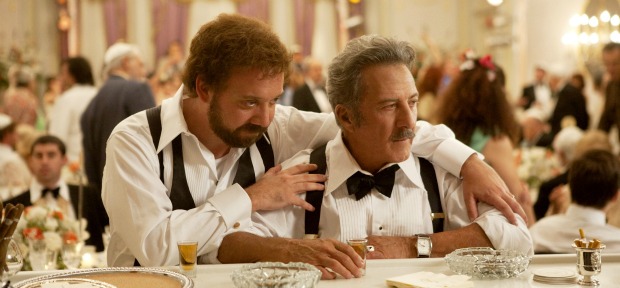Barney’s Version
What unfolds on-screen is the self-justification of a maudlin, chauvinistic man who imaginatively recasts himself as both a hero and a victim.
Plot summary
Barney's Version begins in Rome where Barney meets and marries first wife Clara, a fiery and flame-haired free spirit until he discovers her infidelity with one of his close friends. Encouraged by his father and close confidante, his second shot at marriage sees Barney wed a wealthy Jewish heiress who barely notices him switch off whenever she talks. Ironically it is at their wedding Barney meets the third 'Mrs' P, Miriam who turns out to be his true love and mother to his two children.

Barney’s Version is exactly what it claims to be, at least as far as the title goes – a highly partial ‘version’ of a life. What unfolds on-screen (or in the trailer, which gives away almost every plot point) is the self-justification of a maudlin, chauvinistic man who imaginatively recasts himself as both a hero and a victim. The film is billed as a heart-warming comedy, but perhaps this description only applies if one happens to be a male approaching his autumn years.
Barney’s Version is an indulgent, comforting bedtime story for old men, who want to see another old man behave boorishly and attract a string of women that he has done very little to deserve. It feels like 500 Days of Summer for geriatrics. The source material is a semi-autobiographical novel of the same name written by late Canadian author Mordecai Richler, who was 70 when he wrote it. Whether this film does the book justice is hard to say; after all, the word ‘version’ implies alternative viewpoints, but the film fails to tackle this nuance.
Barney Panofsky is a Canadian TV producer whose life is honeyed by money rather than charm, wit or kindness. He plays at the bohemian life in Rome, bankrolling his artist friends in exchange for Beat cool. After losing his first wife – a cartoonish Manic Pixie Dream Girl – he moves back to Canada and drifts into marriage with a brash materialist (Minnie Driver, who is tellingly billed as ‘The 2nd Mrs P.’). He meets Miriam (Rosamund Pike) at his own wedding party and instantly decides he’s in love – she’s beautiful, polite and knows what a cigar is. For Barney, this justifies his uninvited pursuit of her throughout his brief union with his second wife. It’s no give-away to say that he gets what he wants – the movie posters show Barney and Miriam in their wedding get-up – with Miriam asking for just one condition. Unfortunately for her, Barney inevitably fails to keep even that small promise.
Being a callow youth I failed to see why on earth these women would give Barney the time of day, let alone their hand in marriage. The prime reason seems to be money – but this is only implied in Marriage No. 2, and it takes two negotiators to strike such a deal. Pike’s character is portrayed as too angelic to care about Barney’s wealth, and her saintliness does go some way in explaining her patience with him. Nevertheless, the entire story felt like male wish-fulfilment raddled with unimaginative stereotyping- where women are emasculators (‘The 1st Mrs P.’), whores (‘The 2nd Mrs P.’) or saints (‘The 3rd Mrs P.’). Barney, meanwhile, is a put-upon victim, deserving of pity for when they fuck up, and forgiveness when he does. Blurbs for the film try to sell the lead as adorably politically incorrect, but he comes across as a self-pitying ass. Still, the audience is continually asked to indulge in his misdemeanours, and every supporting character exists to ultimately validate the creaky premise that he is nice guy, deep down.
There are some sub-plots regarding Barney’s experiences as a friend, son and father, which are much more enjoyable than the disappointing portrayal of women. Dustin Hoffman plays Barney’s father, and upstages Paul Giamatti in every scene they share simply by showing how to be an unreconstructed old man whilst retaining that crucial element – charm. In fairness, most of the performances are solid work. Driver particularly stands out in her role as the very spoilt, very Jewish daddy’s girl, and Scott Speedman carries off his loveable waster part with aplomb. Pike plays her usual self; a lusted-over yet morally pure muse. She does it well, but it feels like watching an extension of her off-duty persona. The film suffers from a slight made-for-TV ambiance that hamstrings the sorrowful climax, and the direction is unremarkable.
It’s understandable that this complacent film is catnip to Golden Globes judges and film critics. After all, middle-aged men make up a significant proportion of the film critic demographic – asking them to sensibly review Barney’s Version is like asking a ten year old boy to give an informed opinion on Batman Forever, or a Dirty Dancing obsessive to critique the work of Patrick Swayze. Approach with caution…











COMMENTS